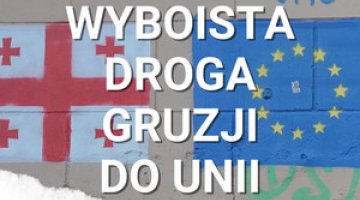Salome Zurabishvili, Georgia’s new president
The second round of presidential elections in Georgia on 28 November was won by Salome Zurabishvili, who ran as an independent candidate but was supported by the ruling Georgian Dream party. According to unofficial results provided by the Central Electoral Commission, after the results from 100% of the polling places were counted, Zurabishvili received 59.5% of the vote, and her rival Grigol Vashadze (of the United National Movement, founded by the former president Mikheil Saakashvili) got 40.5%. Turnout was 56.2% (compared to 47.8% in the first round). Zurabishvili is the fifth president of Georgia (her predecessors were Zviad Gamsakhurdia, Eduard Shevardnadze, Mikhail Saakashvili and Giorgi Margvelashvili), and the first female head of state in the entire Southern Caucasus. She is also the last Georgian president who has been elected in a general election; as a result of constitutional changes, starting from 2023 the country’s president will be chosen by a 300-person Electoral College, composed of all the country’s parliamentary deputies and representatives of local governments.
The election campaign was characterised by large-scale brutality, especially in the period after the first round of voting, which was held on 28 October. ‘Black PR’ predominated: representatives of Vashadze’s and Zurabishvili’s camps tried not so much to promote their own candidates as to discourage votes for their rivals. Politicians of the United National Movement accused the ruling party of bribing voters and using intimidation, while representatives of Georgian Dream accused the opposition of preparing a revolution. In various parts of the country there were clashes involving supporters of both candidates.
On the election day itself there were numerous irregularities and incidents. The Central Election Commission received 261 complaints from representatives of the campaign teams and local observers. These were mainly related to procedural issues (Vashadze’s team previously reported that they had recorded nearly 800 such cases). The Georgian Interior Ministry initiated six investigations; for example, in one town a member of the local government representing Georgian Dream went into the voting booth with a voter, helping him to vote. The opposition has so far failed to call for any protests to be held. A press conference by the OSCE’s observation mission is to be held in the next few hours.
Commentary
- The irregularities and incidents reported cannot affect the overall outcome of the elections, since the gap between both candidates was too high. On the one hand, the election confirmed the dominant position of Georgian Dream on the country’s political scene, which has now lasted for six years (it won the parliamentary elections in 2012 and 2016, the local elections in 2014 and 2017, and supported the winning candidate Giorgi Margvelashvili in the presidential elections of 2013). On the other hand, the campaign and the voting itself showed a growing polarisation within Georgian society, as well as the increasingly apparent fatigue at the rule of Georgian Dream and the billionaire Bidzina Ivanishvili, the leader of Georgian Dream, who retains a decisive influence on the policy of the country and takes the most important personnel decisions. This was demonstrated in the first-round results, in which Zurabishvili’s lead over Vashadze was minimal (38.64% to 37.74%); and third place was won by Davit Bakradze (of the European Georgia party, which split from the United National Movement at the start of 2017), with a good result of 10.97%
- It seems that in this situation, Zurabishvili’s victory was primarily decided by the reluctance among voters to destabilise the situation, together with the fear that success for the opposition candidate could entail social unrest and upheavals. This conviction was also influenced not only by the propaganda of Georgian Dream, but also by statements from Vashadze (and previously by Bakradze) that if they won, the opposition would seek the dissolution of parliament and early elections, and that the former president Mikheil Saakashvili – who is currently resident abroad, and who faces legally binding court judgements at home (dictated by the logic of political revenge) – would be pardoned. Vashadze was not helped in this situation by a gesture from Bakradze, who after the first round called on his supporters to vote for the United National Movement’s candidate. Another factor of great importance was the unconventional measures taken by the government camp before the second round, especially the so-called ‘credit amnesty’: on 19 November, Prime Minister Mamuka Bakhtadze announced that the state will cover the debts of people who have been unable to pay off their bank loans (a number of about 700,000 people), if their debts, calculated without interest and contractual penalties, do not exceed 2000 lari (about US$750). This declaration came after a rally for Vashadze which highlighted irregularities in the banking system, including the very high cost of loans and unacceptable practices such as confiscating housing to repay debts. From further statements by the government, it appeared that the measures to pay the debts (amounting to 1.5 billion lari – more than US$560 million) would come from the Kartu foundation, established by Ivanishvili.
- In his first statement after the election (after the announcement of the exit polls), Vashadze challenged the legitimacy of the election (“in this election, the so-called government and the ‘Thieving Dream’ lost the last shadow of legality”), although he also noted that he would make a statement after the final results have been announced. When it turned out that Zurabishvili’s lead over him was significant, he limited himself to an announcement that he would present a further plan of action after holding consultations with the supporters. He also distanced himself from statements made by Saakashvili, who called on supporters not to recognise the results and start civil disobedience actions: Vashadze said that this was just the personal opinion of a single individual. In connection with this, it seems that the opposition will either give up or reduce its activity on the streets (demonstrations, rallies, protests), focusing on the political ‘long march’ whose goal will be success in the parliamentary elections scheduled for 2020. The most important issue for them is to create a broad and coherent opposition coalition, composed of the United National Movement, European Georgia, and smaller groups.
ANNEX
Salome Zurabishvili was born in 1952 in France into a family of descendants of ‘white emigrés’. She came to Georgia in 2003 as ambassador to France. After the ‘Rose Revolution’, she adopted Georgian citizenship and became the country’s foreign minister (2004-5). She left after coming into conflict with Mikheil Saakashvili. In the first phase of the current campaign, she made a series of unfortunate statements, including saying that Georgia started the war with Russia in 2008 (as she explained later, she meant that President Saakashvili had attacked his own citizens in South Ossetia). Thereafter, her opponents accused her of being a hidden supporter of the pro-Russian option, who was working to benefit Moscow. In turn, her statement suggesting that she favoured the further liberalisation of the legislation on soft drugs (this summer, the Georgian Constitutional Court in practice decriminalised the use of marijuana) sparked criticism from the influential hierarchy of the Georgian Orthodox Church, which enjoys great authority in the country. Between the first and the second round she limited her media activity, which could have contributed to her victory.



